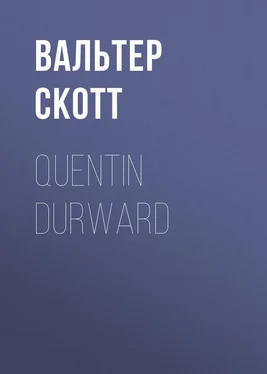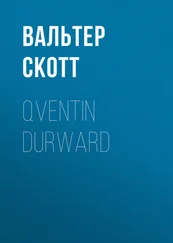Вальтер Скотт - Quentin Durward
Здесь есть возможность читать онлайн «Вальтер Скотт - Quentin Durward» — ознакомительный отрывок электронной книги совершенно бесплатно, а после прочтения отрывка купить полную версию. В некоторых случаях можно слушать аудио, скачать через торрент в формате fb2 и присутствует краткое содержание. Жанр: foreign_antique, foreign_prose, Альтернативная история, на английском языке. Описание произведения, (предисловие) а так же отзывы посетителей доступны на портале библиотеки ЛибКат.
- Название:Quentin Durward
- Автор:
- Жанр:
- Год:неизвестен
- ISBN:нет данных
- Рейтинг книги:3 / 5. Голосов: 1
-
Избранное:Добавить в избранное
- Отзывы:
-
Ваша оценка:
- 60
- 1
- 2
- 3
- 4
- 5
Quentin Durward: краткое содержание, описание и аннотация
Предлагаем к чтению аннотацию, описание, краткое содержание или предисловие (зависит от того, что написал сам автор книги «Quentin Durward»). Если вы не нашли необходимую информацию о книге — напишите в комментариях, мы постараемся отыскать её.
Quentin Durward — читать онлайн ознакомительный отрывок
Ниже представлен текст книги, разбитый по страницам. Система сохранения места последней прочитанной страницы, позволяет с удобством читать онлайн бесплатно книгу «Quentin Durward», без необходимости каждый раз заново искать на чём Вы остановились. Поставьте закладку, и сможете в любой момент перейти на страницу, на которой закончили чтение.
Интервал:
Закладка:
When mass was ended, they retired together from the chapel, and the elder said to his young comrade, “It is but a short walk from hence to the village – you may now break your fast with an unprejudiced conscience – follow me.”
Turning to the right, and proceeding along a path which seemed gradually to ascend, he recommended to his companion by no means to quit the track, but, on the contrary, to keep the middle of it as nearly as he could. Durward could not help asking the cause of this precaution.
“You are now near the Court, young man,” answered his guide; “and, Pasques-dieu! there is some difference betwixt walking in this region and on your own heathy hills. Every yard of this ground, excepting the path which we now occupy, is rendered dangerous, and well nigh impracticable, by snares and traps, armed with scythe blades, which shred off the unwary passenger’s limb as sheerly as a hedge bill lops a hawthorn sprig – and calthrops that would pierce your foot through, and pitfalls deep enough to bury you in them for ever; for you are now within the precincts of the royal demesne, and we shall presently see the front of the Chateau.”
“Were I the King of France,” said the young man, “I would not take so much trouble with traps and gins, but would try instead to govern so well that no man should dare to come near my dwelling with a bad intent; and for those who came there in peace and goodwill, why, the more of them the merrier we should be.”
His companion looked round affecting an alarmed gaze, and said, “Hush, hush, Sir Varlet with the Velvet Pouch! for I forgot to tell you, that one great danger of these precincts is, that the very leaves of the trees are like so many ears, which carry all which is spoken to the King’s own cabinet.”
“I care little for that,” answered Quentin Durward; “I bear a Scottish tongue in my head, bold enough to speak my mind to King Louis’s face, God bless him – and for the ears you talk of, if I could see them growing on a human head, I would crop them out of it with my wood knife.”
CHAPTER III: THE CASTLE
Full in the midst a mighty pile arose,
Where iron grated gates their strength oppose
To each invading step – and strong and steep,
The battled walls arose, the fosse sunk deep.
Slow round the fortress roll’d the sluggish stream,
And high in middle air the warder’s turrets gleam.
While Durward and his acquaintance thus spoke, they came in sight of the whole front of the Castle of Plessis les Tours, which, even in those dangerous times, when the great found themselves obliged to reside within places of fortified strength, was distinguished for the extreme and jealous care with which it was watched and defended.
From the verge of the wood where young Durward halted with his companion, in order to take a view of this royal residence, extended, or rather arose, though by a very gentle elevation, an open esplanade, devoid of trees and bushes of every description, excepting one gigantic and half withered old oak. This space was left open, according to the rules of fortification in all ages, in order that an enemy might not approach the walls under cover, or unobserved from the battlements, and beyond it arose the Castle itself.
There were three external walls, battlemented and turreted from space to space and at each angle, the second enclosure rising higher than the first, and being built so as to command the exterior defence in case it was won by the enemy; and being again, in the same manner, itself commanded by the third and innermost barrier.
Around the external wall, as the Frenchman informed his young companion (for as they stood lower than the foundation of the wall, he could not see it), was sunk a ditch of about twenty feet in depth, supplied with water by a dam head on the river Cher; or rather on one of its tributary branches. In front of the second enclosure, he said, there ran another fosse, and a third, both of the same unusual dimensions, was led between the second and the innermost inclosure. The verge, both of the outer and inner circuit of this triple moat was strongly fenced with palisades of iron, serving the purpose of what are called chevaux de frise in modern fortification, the top of each pale being divided into a cluster of sharp spikes, which seemed to render any attempt to climb over an act of self destruction.
From within the innermost enclosure arose the Castle itself, containing buildings of all periods, crowded around, and united with the ancient and grim looking donjon keep, which was older than any of them, and which rose, like a black Ethiopian giant, high into the air, while the absence of any windows larger than shot holes, irregularly disposed for defence, gave the spectator the same unpleasant feeling which we experience on looking at a blind man. The other buildings seemed scarcely better adapted for the purposes of comfort, for the windows opened to an inner and enclosed courtyard; so that the whole external front looked much more like that of a prison than a palace. The reigning King had even increased this effect; for, desirous that the additions which he himself had made to the fortifications should be of a character not easily distinguished from the original building (for, like many jealous persons, he loved not that his suspicions should be observed), the darkest coloured brick and freestone were employed, and soot mingled with the lime, so as to give the whole Castle the same uniform tinge of extreme and rude antiquity.
This formidable place had but one entrance – at least Durward saw none along the spacious front, except where, in the centre of the first and outward boundary, arose two strong towers, the usual defences of a gateway; and he could observe their ordinary accompaniments, portcullis and drawbridge – of which the first was lowered, and the last raised. Similar entrance towers were visible on the second and third bounding wall, but not in the same line with those on the outward circuit; because the passage did not cut right through the whole three enclosures at the same point, but, on the contrary, those who entered had to proceed nearly thirty yards betwixt the first and second wall, exposed, if their purpose were hostile, to missiles from both; and again, when the second boundary was passed, they must make a similar digression from the straight line, in order to attain the portal of the third and innermost enclosure; so that before gaining the outer court, which ran along the front of the building, two narrow and dangerous defiles were to be traversed under a flanking discharge of artillery, and three gates, defended in the strongest manner known to the age, were to be successively forced.
Coming from a country alike desolated by foreign war and internal feuds – a country, too, whose unequal and mountainous surface, abounding in precipices and torrents, affords so many situations of strength, young Durward was sufficiently acquainted with all the various contrivances by which men, in that stern age, endeavoured to secure their dwellings; but he frankly owned to his companion, that he did not think it had been in the power of art to do so much for defence, where nature had done so little; for the situation, as we have hinted, was merely the summit of a gentle elevation ascending upwards from the place where they were standing.
To enhance his surprise, his companion told him that the environs of the Castle, except the single winding path by which the portal might be safely approached, were, like the thickets through which they had passed, surrounded with every species of hidden pitfall, snare, and gin, to entrap the wretch who should venture thither without a guide; that upon the walls were constructed certain cradles of iron, called swallows’ nests, from which the sentinels, who were regularly posted there, could without being exposed to any risk, take deliberate aim at any who should attempt to enter without the proper signal or password of the day; and that the Archers of the Royal Guard performed that duty day and night, for which they received high pay, rich clothing, and much honour and profit at the hands of King Louis. “And now tell me, young man,” he continued, “did you ever see so strong a fortress, and do you think there are men bold enough to storm it?”
Читать дальшеИнтервал:
Закладка:
Похожие книги на «Quentin Durward»
Представляем Вашему вниманию похожие книги на «Quentin Durward» списком для выбора. Мы отобрали схожую по названию и смыслу литературу в надежде предоставить читателям больше вариантов отыскать новые, интересные, ещё непрочитанные произведения.
Обсуждение, отзывы о книге «Quentin Durward» и просто собственные мнения читателей. Оставьте ваши комментарии, напишите, что Вы думаете о произведении, его смысле или главных героях. Укажите что конкретно понравилось, а что нет, и почему Вы так считаете.












